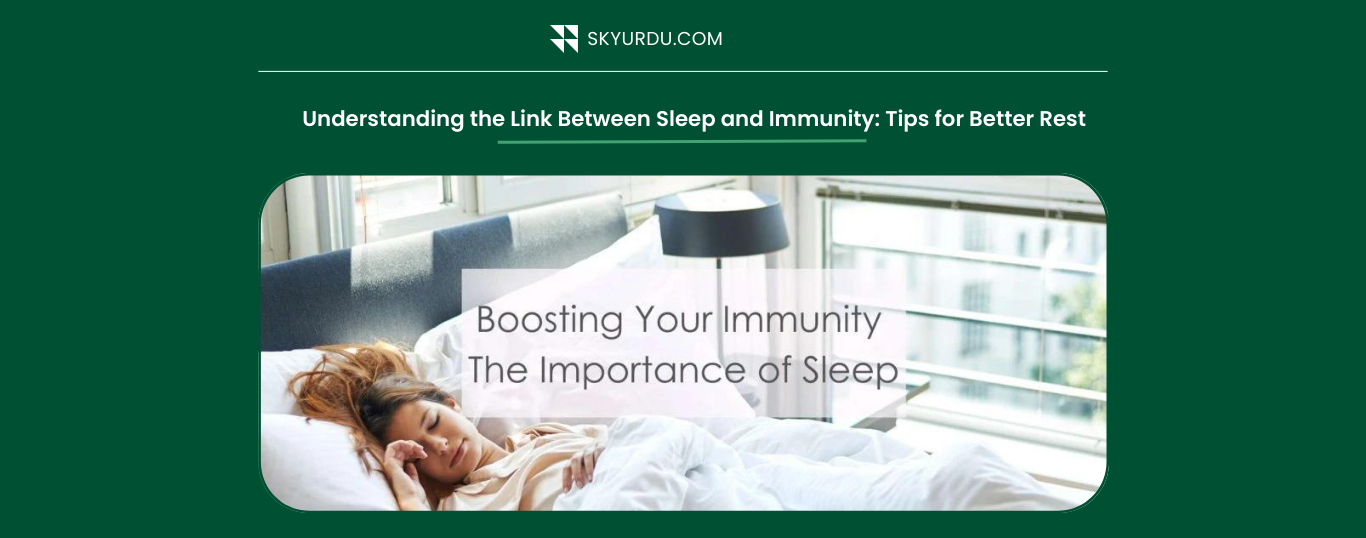We all take sleep for granted in the modern busy society while, in fact, is one of the fundamentals of health with interactions to almost every human health factor. Another common but critical association that people neglect is between the immune system and sleep. Here in this piece of writing, we are going to learn about how sleep plays a major role in immunity and how we should maintain proper sleep.
The Science Behind Sleep and Immunity
Immune system is the natural defense of the body against diseases causing agents such as viruses, bacteria and others. It is made up of an intricate structure, that is cell, tissue as well as the organs that form part of the immune system and help to identify and neutralize these dangers.
While you are asleep, your body produces and releases cytokines, a sort of protein that attacks infection and inflammation. It also means you have some cytokines whose levels must rise when you are infected or under stress. If you don’t get enough sleep, your body makes less of these ’’good’’ cytokines thus leaving your body prone to sickness.
Numerous studies have demonstrated the detrimental effects of poor sleep on the immune system. Here are some of the key findings
1. Increased Susceptibility to Illness: Those individuals, who do not pay proper attention to the need of having proper sleep, will be prone to catch a flu or other normal ailments.
2. Slower Recovery: Sound sleep is also important because it makes one develop slow recovery. When you have received low amounts of sleep your body lacks the ability to produce immune cells that are required to fight diseases.
3. Chronic Inflammation: Lack of sleep is known to cause chronic inflammation, which can be whereby the immune system is always on alert. Inflammation is a known root cause of many diseases and, if it becomes long-term or chronic, is associated with many of the diseases of civilization such as heart disease, diabetes and certain types of cancer.
4. Vaccination Response: People who do not get enough sleep have a weak immune system to fight the vaccines that the body is given.
How Much Sleep Do You Need?
Nonetheless the recommended hours of sleep to be taken depend with age, the kind of life you lead, and the general health of the body. However, most adults need to have between 7 to 9 hours of sleep to ensure they get the best of their health.
The quality of the sleep becomes a serious issue, besides the number of hours the child spends asleep. Slow wave sleep or *deep sleep* is pregnant for immunes response.
10 Tips For Better Sleep For A Stronger Immune System
Getting better sleep has potentially transformative effects on a person’s immune system and their physical wellbeing. Here are some tips to help you get better rest.
1. Get and Stick to a Sleep Schedule
It is advisable to sleep and wake up with the clock and preferably without changing the routine even on weekends. It helps to strengthen the circadian rhythm that your body has built over time
2. Develop a Good Night’s Sleep habits/rituals
Having a pre-sleep routine can make the body to relax and start producing sleep hormones, notifying the body that it is time to sleep. This might be reading, bathing, or performing breathing exercises such as deep breathing or meditation among others.
3. Optimize Your Sleep Environment
It is often said that ones bedroom should be one’s personal haven. To enhance sleep, maintain a scenery that has low light, reduced noise levels, and consistent low temperature. Use blackout curtains, earplugs or a white noise machine if the distractions are out of the question.
Read More… DRIVING OPPORTUNITIES BIKE RIDERS
4. Pay Particular Attention to What You Eat and Your Caffeine Consumption
Diets also play a very vital role when it comes to sleep since foods and beverages that an individual takes can either help him/her to have a good sleep or make him/her be wakeful throughout the night. Do not have meals particularly rich foods, caffeine containing products and alcohol several hours to bed time since they may interfere with sleep.
5. Get Regular Exercise
Exercise has a way of improving the amount of time one takes to fall asleep and the quality of their sleep. However, it is advisable that one should avoid exercise during the 3 hours before going to bed as you will be too charged up to sleep.
6. Manage Stress and Anxiety
Working stress and anxiety are typical reasons behind the deterioration of sleep. Stress management exercises practiced before bedtime like deep breathing, yoga or writing journals could ease the mind ready for sleep.
7. Limit Naps
Short naps can be rather helpful, especially if you have been sleep deprived the previous night, however long or irregular napping can disrupt the night sleep.
